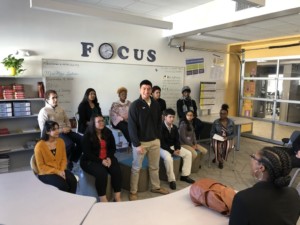When Worlds Collide
 It was a tough week for those of us that supported NCLB for the bipartisan support for equity it signaled and the baseline school accountability system it required. With an little iterative development (i.e., if congress had fixed it a couple times), we’d be in a different place right now.
It was a tough week for those of us that supported NCLB for the bipartisan support for equity it signaled and the baseline school accountability system it required. With an little iterative development (i.e., if congress had fixed it a couple times), we’d be in a different place right now.
The president preempted the House by announcing waivers to 10 states. Rick Hess called the RttT-inspired unauthorized-reform-agenda-by waiver maneuver shameless, but I appreciate that Duncan & Co. were at least trying to make things better for kids.
On the other hand, Kline’s proposal had a political rather than educational theory of action. Perhaps he doesn’t recall how most states ignored chronic failure through the eighties and nineties.
Petrilli calls BS on this back-to-local-control weird-bedfellows stuff in a great Fordham post (they’re the only folks talking about the real problem—governance). He lays out a solution that a state could take (give either Obama’s waivers or Klein’s eviseration). “In education, that would mean:
- Empowering building-level educators to make nearly all of the key decisions about how their schools operate (including which curriculum to use, how to hire, pay, and evaluate teachers, what to invest dollars in, etc.);
- Giving parents the right to choose among schools in order to find a good match with their own preferences and values;
- Raising the funds for our schools at a central level, then redistributing them in an equitable manner to individual schools—in return for acceptable academic results.
It’s also frustrating to hear folks on both sides of the isle carp about Common Core standards. It’s such an improvement over 50 state standards, most of which are not linked to college and career readiness. Come on folks—this just makes sense. In the age of digital learning where opportunities are unbounded by geography, it just makes sense to have common standards across state lines.
The DC collision of waivers and rollbacks looks like both sides of the aisle in full reverse when we should be pressing ahead to full digital learning opportunity for all students, as spelled out in Digital Learning Now, with a common set of standards, lots of providers, and funding that follows students to the best option.








@K12virtual
Tom,
Saw you speak yesterday in Rhode Island. Twitter tag, #iptrideconf
You get it and have great ideas...equivalent idea to SIF needed to backend of "Big Data"---impossible dream?
Great ideas...how about an Open Source hook with Edubuntu.org or other that aggregates and "prepackages" all (or at least some) of the great ideas and mindshare??? I.E, bookmark a bunch of favorites in Firefox?
Mark